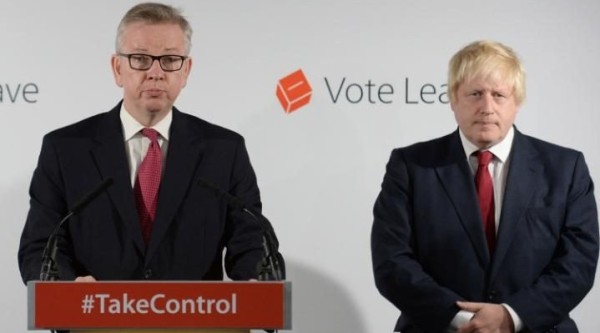PHOTO: Michael Gove and Boris Johnson of the Leave campaign, speaking on Friday
The University of Birmingham’s David Dunn writes for the Spanish newspaper La Razón:
The final figures on the European Union referendum — 51.8% for Leave and 48.2% for Remain — are a perfect symbol for the divided country that follows the Brexit vote. This is no longer a United Kingdom.
The divisions are not just over where the votes went. The UK is split between generations, level of education, class, and outlook. It is split between its four nations, with England and Wales voting Leave while Scotland and Northern Ireland voted to Remain. The debate has divided people over attitudes to immigrants, in a campaign marked by ugly nativist rhetoric which willfully ignored rational argument in favor of emotional and atavistic sentiments.
See EA’s full Britain and Europe coverage
None of these divisions will be easily healed. Some may widen. Scotland is likely to hold another independence referendum soon. There are renewed calls, led by the republican party Sinn Fein but including others, for Northern Ireland to look to union with the Irish Republic to the south.
David Cameron’s decision to resign as Prime Minister further adds to the instability that Brexit brings. His pledge to go within three months opens the door for a leadership contest within his Conservative Party. A new leader will also want a mandate to govern and so a general election is likely before the end of the year. That new Prime Minister, undoubtedly pro-Brexit, will want to purge his Parliamentary party of Europhile MPs.
Meanwhile, the opposition Labor party is widely seen as unelectable under its current leader Jeremy Corbyn. He may not survive until a general election, bringing the further uncertainty of Labor’s own leadership election.
That could improve the party’s fortunes, but the probable result for now is a more conservative, more Euro-sceptic Government, most likely lead by the former Mayor of London, Boris Johnson. This in turn will further propel Scotland to vote for independence.
It is only after a new Prime Minister is confirmed that the UK will begin to re-negotiate the terms of its relationship with the EU. The outcome of that discussion and the pursuit of new trade deals in the global arena will be crucial for the UK and wider relations within Europe.
Securing these deals is unlikely to be as easy, quick, or painless as the Brexiteers imagine. Dealing with the EU will require the agreement of all 27 other states, each of whom has their own agenda in competition with the independent path that Britain has set. The ability to “take back control” in these circumstances may be more illusory than real.
The UK’s decline and division is not yet inevitable. Early in the campaign, Boris Johnson argued that a vote for Brexit would be an opportunity to re-negotiate a better deal for Britain within the EU. While this was widely dismissed at the time, such an outcome might now well be in the interests of all parties.
Both Ireland and Denmark have had referenda on EU Treaty changes and, following “no” votes, have been given more favorable terms which were then approved in a further vote. If Britain’s concerns on immigration and welfare payments are accommodated, then the erosion — of the UK and possibly the EU — might be stopped.
Following Brexit, the forces of disintegration and xenophobia have been strengthened in Europe. The progress made over the last 70 years towards a tolerant, integrated, and liberal political community has been put at risk. Perhaps these forces are now unstoppable, but the effort to try to halt them is worth it, given the consequences of the alternative.

